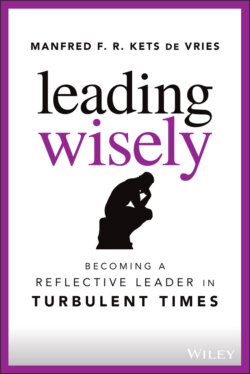Читать книгу Leading Wisely - Manfred F. R. Kets de Vries - Страница 12
Not knowing
ОглавлениеAccording to Plato, the renowned Greek philosopher Socrates went to this temple of Apollo in ancient Thebes and asked the Pythia, the Oracle, ‘Who is the wisest person in Athens.’ The oracle replied, ‘It is you.’
‘That is impossible,’ said Socrates, ‘because I am aware that I know nothing.’
‘That,’ said the Oracle, ‘is exactly why you are the wisest person in Athens.’
Socrates recognized that there was so much he did not know. Knowing this, however, may have been precisely the reason that made him wiser than all the others. It was this awareness of his own ignorance that differentiated him. Thus, in a rather paradoxical way, Socrates expressed that he knew nothing except that he knew that he knew nothing – in short, he recognized the many unknowns in his world. However, does the possession of wisdom imply knowing that you don't know? Is it the acceptance of your own ignorance? Thus, the greatest wisdom may very well lie in the explicit recognition that one is not all knowing.
Hopefully, you have entered a stage of life when you realize how little you know. Of course, you may think, somewhat nostalgically, about your younger years when you thought that you knew everything, but if you are truly in pursuit of wisdom, these thoughts will be fleeting. Only when you realize how little you really know will you make the effort to continue trying to understand what the world has to offer. Eventually, like Socrates, you may have figured out that knowledge is infinite, that knowledge changes at all times, and that all knowledge is transient as it is linked to the world around it. Therefore, knowledge is subject to change as the world is ever in the process of changing. It is for exactly this reason that Socrates felt compelled to continue searching for new knowledge and to understand things even better. This never-ending pursuit of knowledge may have been undertaken with the hope that wisdom eventually would be within reach. To attain it, however, was going to be another story. Wisdom has this infuriating tendency to always remain untouchable.
A wise old man, a guest of the king, spent his days dressed magnificently, eating the greatest delicacies at the king's table. The advisers sought his advice and the powerful laughed heartily at his jokes, while the relatives of the king showered him with gifts.
A party of young, arrogant noblemen met the old man one day amidst the lush trees within the royal garden and challenged him about his wisdom: ‘Now tell us Seeker of the Truth, given all the things you know, how many grains of sand would fit in this bucket?’
‘My apologies, your fine noblemen, I haven't the faintest idea.’
‘Well, how disappointing! But let's ask you something else. Can you tell us this simple thing: Why can you see in a mirror your right and left eye and ear reversed in the reflection but not your face upside down?’
‘If I only knew, you priceless offspring of your eminent fathers.’
But the young noblemen didn't know how to stop pestering the wise old man. ‘Then, tell us at the least, what is the meaning of life?’
‘As far as that's concerned, I only know that I don't know, your very honorable people.’
At this point, the young noblemen exclaimed: ‘You don't know this, and you don't know that! Why then are you, silly, old man, fed and dressed and honored at the royal tables as if you were the wisest of all people?’
‘Oh, your noble people,’ replied the old man, ‘I am dressed in silk and fed with good food only for the little that I know. For if I were to be rewarded for what I don't know, all the treasuries of the world put together would not be sufficient.’
